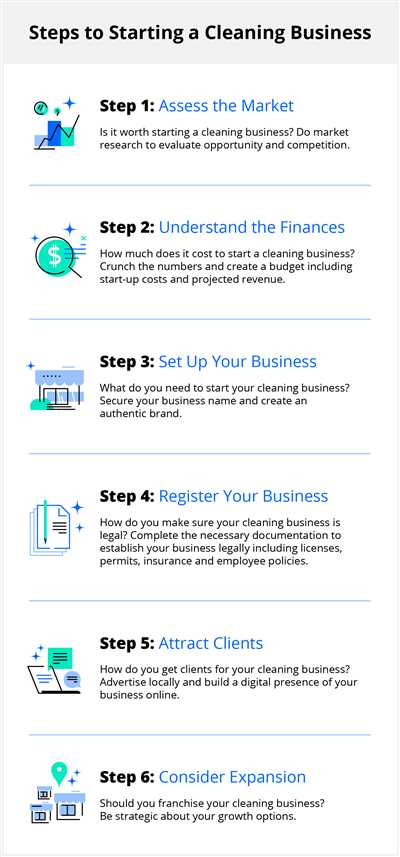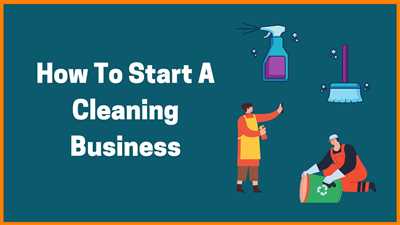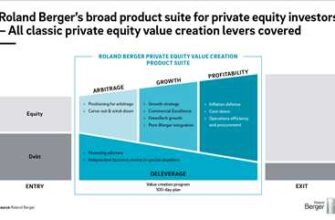
If you’re looking for a new business venture, starting a cleaning service might be the way to go. In today’s busy world, people often don’t have the time or energy to keep their homes tidy, so they turn to cleaning services for help. This means that there is a high demand for this type of service, which can be a profitable opportunity for you.
Before you dive in headfirst, there are several considerations you must take into account. First, you need to decide whether you want to run the business by yourself or if you want to hire employees. Running solo has its advantages – you have more control over your operations and profit. However, if you’re starting with limited time and resources, it might be better to start with a small team.
Next, you need to calculate your costs. This includes not only the cost of cleaning supplies but also your overhead costs, such as vehicle maintenance and insurance. Make sure to also calculate your hourly rate so that you can properly calculate how much to charge your customers.
Once you have all the order and numbers figured out, it’s time to start marketing your cleaning service. One of the most effective means of promotion is through word of mouth. Ask your friends, family, and colleagues if they know anyone in need of a cleaner. Additionally, consider creating leaflets and posting them in visible spaces, such as community bulletin boards and cafes.
Creating a website is also an important step in establishing yourself as a professional cleaning service. A website allows people to easily book your services and provides them with all the necessary information about your company. Make sure to highlight any specialised services you offer, such as deep cleaning or carpet cleaning.
In conclusion, starting a cleaning service can be a profitable and fulfilling venture. However, it requires careful planning, consideration of costs, and effective marketing. By taking these steps and providing excellent service to your customers, you can establish yourself as a successful cleaning service provider.
- How to Start Cleaning if You’re Overwhelmed
- Deep Dive
- An overview of the cleaning industry
- Legal considerations when you set up a cleaning business
- The cost of starting a cleaning business
- Becoming profitable in the cleaning industry
- Taking Bookings
- Take your cleaning business online
- Online bookings
- How to take payments
- Winning contracts and establishing customer loyalty
- Marketing your cleaning business
- What are the different types of cleaning companies
- Residential cleaning
- Commercial cleaning
- Video:
- Things You Need to Know Before Starting a House Cleaning Biz
How to Start Cleaning if You’re Overwhelmed
If you’re feeling overwhelmed with the amount of cleaning that needs to be done, don’t worry, you’re not alone. Cleaning your home or office can seem like a daunting task, but with a few simple strategies, you can get organized and tackle the job head-on.
The first step is to assess your health. Cleaning can involve physical labor and exposure to cleaning chemicals, so it’s important to make sure you’re in good shape before you start. If you have any health concerns, it may be best to hire a professional cleaner to handle the job.
Next, track down all the cleaning tasks that need to be completed. Make a list of both residential and commercial cleaning jobs, such as carpet cleaning, deep cleaning, and tidying up. Having a comprehensive list will help you stay organized and ensure that nothing is overlooked.
Once you have your list, consider developing a schedule that helps you prioritize tasks. Some people find it helpful to book appointments with specific cleaning tasks, while others prefer to work through the list as they go. Find a system that works for you and stick to it.
It’s also important to consider the financial aspect of starting a cleaning business. You’ll need to estimate the cost of supplies and equipment, as well as determine how much to charge for your services. Research what other cleaners in your area are charging and find a price that is both profitable for you and competitive in the market.
If you’re working as a solo cleaner, be prepared for long hours and late nights. Cleaning often takes longer than expected, especially for deep cleaning jobs or if you’re unfamiliar with a specific type of property. However, the hard work can be rewarding, as loyal customers and word-of-mouth referrals can help you build a profitable business.
Consider legal and insurance considerations as well. It’s important to have the necessary legal documents and insurance coverage to protect yourself and your business. This can include contracts with customers, liability insurance, and workers’ compensation if you have employees.
When you’re first starting out, it may be beneficial to specialize in a specific area, such as carpet cleaning or janitorial services. This can help you target a specific market and develop expertise in that area. As you grow, you can expand your services to include a wider range of cleaning tasks.
Finally, don’t forget to develop a system for keeping track of invoices and payments. A simple accounting tool or software can help you stay organized and ensure that you’re getting paid on time. This will also make it easier to track your expenses and profits.
Starting a cleaning business can be overwhelming, but with the right strategies and considerations in place, it can also be a profitable venture. Take the time to plan, organize, and develop your skills, and you’ll be well on your way to running a successful cleaning business.
Deep Dive
When starting a cleaning business, there are a few things you must consider before diving in. It’s likely that you’re already aware of the demand, given the number of cleaning companies both online and direct. However, there are a few important considerations to keep in mind to ensure your business is successful.
Training: It’s crucial that you and your employees receive proper training in cleaning techniques, as well as any specialist skills required for certain jobs like carpet cleaning or janitorial services. This not only ensures a high standard of cleanliness but also helps establish a competitive advantage.
Legal and health considerations: As a cleaning business, you have a responsibility to your customers and the environment. You must be aware of any legal requirements and health regulations related to the chemicals and equipment you use. Keeping track of these laws and following proper procedures helps keep both you and your customers safe.
Equipment and supplies: You’ll need to consider what equipment and supplies you’ll need to get started. This includes cleaning tools, janitorial supplies, and possibly even a vehicle or unit to transport your equipment to different job sites. It’s important to invest in high-quality products and stock up on essentials to ensure you’re well-equipped to provide the best service to your customers.
Pricing and profit: Determining how much to charge for your services can be a bit daunting. You’ll need to take into account factors like labor costs, overhead expenses, and the market rate for your area. Researching the prices charged by other cleaning businesses in your area can help you decide on a competitive yet profitable rate.
Marketing: In order to attract customers, you’ll need to invest time and effort into marketing your business. This could involve creating a website, utilizing social media platforms, and even offering special discounts or promotions. Marketing helps create awareness of your business and establishes your brand in the market.
Bookings and appointments: Having an efficient system for managing bookings and appointments is essential. This includes setting clear communication channels with customers, ensuring timely arrivals, and keeping track of upcoming jobs. Utilizing online booking systems or appointment scheduling software can help streamline this process.
Customer service: Providing exceptional customer service is key to establishing a solid customer base. Being friendly, responsive, and professional helps build trust with your customers. Addressing any concerns or issues promptly and effectively is crucial for the success of your business.
Overcoming challenges: Starting a cleaning business can be overwhelming at times, especially when dealing with multiple clients and demanding jobs. It’s important to have a clear overview of your tasks and prioritize them accordingly. Establishing a system that helps you stay organized and focused will make the process more manageable.
First impressions: As a cleaning business, the first impression you make on your customers is crucial. Ensuring thorough cleaning of every room or space and paying attention to details like sparkling windows will leave a lasting impression. Providing a consistently high standard of service from the initial appointment helps build a positive reputation for your business.
Target audience: Identifying your target audience is important for tailoring your marketing efforts. Whether you’re targeting residential or commercial customers, understanding their specific needs and preferences will help you attract the right clientele.
Investment and cost considerations: Starting a cleaning business requires some initial investment. You’ll need to consider the cost of equipment, supplies, marketing, and any necessary licensing or permits. Calculating these expenses and ensuring you have enough funds to cover them is vital for a smooth start.
Work-Life balance: It’s important to find a balance between working hard and taking time for yourself. Cleaning businesses can be demanding, particularly in the initial stages where you may be taking on most of the jobs yourself. Allocating time for rest and leisure activities will help prevent burnout and keep you motivated.
In conclusion, starting a cleaning business can be a profitable and fulfilling venture, but it requires careful planning and consideration. By understanding the various aspects involved, you can establish a successful and competitive cleaning business.
An overview of the cleaning industry
The cleaning industry is a lucrative and in-demand sector that offers a range of services to both residential and commercial clients. Cleaning companies provide essential tasks such as dusting, vacuuming, mopping, and sanitizing, ensuring that homes and offices are kept clean and hygienic.
There are various types of cleaning services available, each specializing in particular areas. For example, some companies focus on deep cleaning homes, while others specialize in office cleaning. There are also specialist cleaners who handle specific tasks like oven cleaning or carpet cleaning.
When starting a cleaning business, it is important to establish the specific type of cleaning you wish to specialize in. This will help you target a niche market and differentiate yourself from competitors. Additionally, understanding the needs of your target customers is crucial in determining the services you offer.
To start a cleaning business, you must first consider the legal requirements and obtain the necessary licenses or permits. It is also essential to calculate the initial costs involved in setting up the business, including equipment, cleaning supplies, and training for employees.
Once established, you will need to develop a marketing strategy to attract clients. This could include creating an online presence through a website or social media platforms, as well as traditional forms of advertising such as flyers or local media.
Building a strong customer base is crucial for a successful cleaning business. Developing good relationships with clients, offering competitive prices, and delivering high-quality services will help establish customer loyalty. Effective communication, particularly when it comes to scheduling appointments and discussing specific cleaning needs, is also key to maintaining a satisfied customer base.
Invoices and payments are an important part of running a cleaning business. You must establish a system to track appointments, send invoices, and collect payment from clients. Online tools can be utilized to streamline this process and ensure efficient payment management.
Health and safety are paramount in the cleaning industry. Cleaners regularly come into contact with potentially hazardous materials, chemicals, and spills. Proper training and adherence to safety regulations are necessary to prevent accidents and protect both employees and clients.
One of the challenges of the cleaning industry is dealing with unexpected or overwhelming cleaning tasks. Clients may require emergency cleaning services for events or when moving out of a property. Being able to accommodate these requests and provide quality service at short notice can be a winning factor for your business.
Having the right tools and equipment is essential for a cleaning business. This includes cleaning supplies, a reliable vehicle to transport equipment, and specialized tools for specific tasks. Investing in quality equipment will not only improve efficiency but also showcase your professionalism to clients.
It is important to keep up with industry trends and advancements. Continuing education and training can help you stay updated on the latest cleaning techniques, products, and regulations. This knowledge can give you a competitive edge in the market.
In conclusion, the cleaning industry offers a range of services that are in high demand. Starting a cleaning business requires careful planning, establishing a niche, and specializing in specific services. Building strong relationships with clients, maintaining health and safety standards, and staying up to date with the latest industry advancements are key to running a successful cleaning business.
Legal considerations when you set up a cleaning business
Starting a cleaning business requires careful planning and consideration of various legal aspects. Here are some important legal considerations you must keep in mind:
1. Business structure: You need to decide whether you want to establish a small sole proprietorship or a more formal legal entity like a limited liability company (LLC). Each choice has different legal and financial implications, so it’s essential to figure out the structure that aligns with your specific needs.
2. Licensing and permits: Check the local laws and regulations to determine if you need any licenses or permits to operate a cleaning business in your area. Some locations may require specific certifications or training for certain types of cleaning services, such as window cleaning or handling hazardous materials.
3. Insurance: Having the right insurance coverage is crucial to protect yourself, your employees, and your clients. General liability insurance is a must to cover any damages or accidents that may occur during cleaning jobs. You may also consider additional coverage for workers’ compensation, property damage, and theft.
4. Employment laws: If you plan to hire employees, familiarize yourself with relevant employment laws, including minimum wage, overtime pay, and worker safety regulations. It’s essential to understand your obligations as an employer and ensure compliance with all legal requirements.
5. Contracts and agreements: Utilize contracts and agreements to clearly outline the scope of your cleaning services, rates, terms, and any additional terms and conditions. This will help protect both you and your clients and establish clear expectations for both parties.
6. Taxes and accounting: Keep accurate records of your income and expenses related to your cleaning business for tax purposes. Consider consulting a specialist to ensure proper tax planning and compliance with tax regulations.
7. Marketing and advertising: When advertising your cleaning services, make sure to comply with any laws and regulations related to marketing and advertising. Ensure you present your services honestly and without misleading claims.
8. Health and safety: As a cleaning business owner, you’re responsible for providing a safe and healthy work environment for your employees. Implement proper training programs to educate your staff on handling cleaning materials, equipment, and potential hazards.
By considering these legal aspects before diving into the cleaning business, you’ll be better prepared to handle any legal challenges that may arise and ensure a smooth and successful start to your venture.
The cost of starting a cleaning business
Starting a cleaning business can be a well-thought-out decision for people with specialized skills in tidying and cleaning. However, it’s important to track all the costs and considerations involved in establishing your own operations.
One of the first things you’ll need to figure out is how much money you’ll need to invest in order to get your business up and running. This means considering the cost of supplies, equipment, training, and establishing a website. While you can start with basic supplies like cleaning materials and transportation, it would be wise to invest in specific tools and equipment for different cleaning needs, such as a vacuum cleaner, an oven cleaning unit, and more.
Another important consideration is the cost of acquiring customers. While word-of-mouth and referrals may help, you’ll need to invest in marketing materials like business cards, leaflets, and advertisements. You can also consider creating a website to help potential customers find and learn more about your services.
Training is also an important investment. While being a cleaner may seem like an easy job, there are specific skills and techniques that can be learned through training courses. This helps you provide a high level of service and establish a loyal customer base.
Being a residential cleaning service means that you’ll be dealing with people’s homes, and their health and safety will be of utmost importance. This means you may need to invest in special materials to ensure a hygienic and safe environment for your customers.
Another cost to consider is the time you’ll spend on each job. While some customers may appreciate a thorough cleaning, others may prefer a quick tidying. You’ll need to be able to estimate the required time and price your services accordingly.
Lastly, transportation is a key component of your operations. You’ll need a reliable means of transportation to get to each client, which could mean factoring in the cost of a vehicle or fuel.
Overall, the cost of starting a cleaning business can vary greatly depending on the specific needs and circumstances. However, considering all these factors will help you make a more informed decision and better understand the investment required.
Becoming profitable in the cleaning industry
Starting a cleaning business can be a lucrative venture if done correctly. Here are three key factors to consider when becoming profitable in the cleaning industry.
- Specialize in specific cleaning services: There are companies that provide general cleaning services, but if you want to stand out, consider specializing in certain areas. You could focus on residential cleaning, deep cleaning, or even become a specialist in carpet or oven cleaning. By offering specialized services, you can target a specific market and charge higher prices.
- Establish efficient operations: In order to be profitable, you need to have efficient operations in place. This means having a system for taking bookings, managing appointments, and communicating with clients. Consider using software or tools to help you track jobs and payments. By streamlining your operations, you can lower costs and increase productivity.
- Pricing your services: Pricing your services appropriately is crucial for profitability. Consider the costs of materials, labor, and any specialized tools or chemicals you may need. You should also take into account the time it takes to complete a job. Research the industry and see what other companies charge for similar services. By pricing competitively, you can attract customers and maximize your profits.
Furthermore, it is important to consider other factors such as safety, contracts, and marketing. Safety should always be a priority, especially when handling potentially harmful chemicals or entering people’s homes or office spaces. Contracts can help protect both you and your client, establishing clear expectations and terms. Finally, marketing and advertising through social media and other channels can help you establish a strong online presence and attract more customers.
Starting a cleaning business may seem overwhelming at first, but by considering these factors and adjusting your operations accordingly, you can become profitable in the industry.
Taking Bookings
Once you have established your cleaning business and set up your schedule, it’s time to start taking bookings. This is a crucial step in ensuring that you have a steady stream of customers and a profitable business.
First, you need to decide what type of cleaning services you want to offer. You could specialize in residential cleaning, office cleaning, or even deep cleaning for things like oven spills. Consider the materials and safety needs of each type of service to ensure that you can complete the job well.
Next, you should target your marketing efforts towards the customers that are most likely to book your services. This could be individuals who own homes or businesses that need regular cleaning. You can distribute leaflets, advertise on a website, or even enter into partnerships with other businesses to attract customers.
When it comes to pricing your services, consider a few factors such as the amount of time required to complete the job, the cost of materials, and your desired profit margin. Make sure to communicate your pricing clearly to potential customers so there are no surprises when they receive their invoices.
Once you start receiving bookings, it’s important to stay organized and professional. Keep track of your schedule and make sure to arrive on time for each appointment. If you’re running late, communicate with the client in advance to let them know. This will help build loyalty and trust with your customers.
As your business grows, you may need to adjust your schedule and consider hiring employees to help with the workload. However, if you’re just starting out, it’s often more profitable to work solo and take on only as many bookings as you can handle.
Make sure that you have a system in place to handle payments and keep your accounts in order. This includes sending out invoices, collecting payments, and making sure you’re following all legal requirements for your business.
Finally, always pay attention to the details and provide a high quality service to your customers. Little things like being thorough, respectful of their space, and paying attention to their specific needs will go a long way in building a positive reputation for your business.
By taking these considerations into account, you can ensure that taking bookings for your cleaning business is a smooth and profitable process.
Take your cleaning business online
With the ever-growing reliance on technology, it’s important for cleaning businesses to have an online presence. This not only helps establish your business in the digital world, but also allows you to communicate with clients more effectively.
Having a good website is essential. This is where potential clients can dive into the details of your cleaning services and understand what you specialize in. Make sure to include all the required information, such as pricing, types of cleaning you offer, and any specialise janitorial services you provide.
By taking your business online, you can also offer clients the option to book appointments and make payments through your website. This not only helps streamline your operations, but also gives clients the convenience and flexibility they’re likely to appreciate.
Another benefit of being online is the ability to send invoices and track payments electronically. This means you don’t have to rely on paper invoices and can lower the cost of operations. It also helps ensure that you get paid on time and have a clear record of transactions.
Social media is another powerful tool that can help you reach more potential customers and establish your brand. By maintaining a presence on platforms such as Facebook and Instagram, you can engage with people and build a community of loyal customers. It’s also a great way to showcase before-and-after photos of your work and receive positive feedback.
Taking your cleaning business online may require some investment initially, but it can significantly help increase your profitability in the long run. Not only can you reach a wider target audience, but you can also automate certain processes and save both time and money.
However, it’s important to note that even with an online presence, you still need to deliver on your promises. Remember to provide a high level of service, communicate effectively, and ensure the safety of your clients’ properties during cleaning operations. These factors are key to developing a good reputation and retaining customers.
In conclusion, taking your cleaning business online is a smart move in today’s digital age. It helps you establish a professional image, reach more customers, and streamline your operations. Make sure to pay attention to details, offer competitive pricing, and continually adapt to meet the ever-changing needs of your clients. With the right strategies in place, your cleaning business can thrive in the online space.
Online bookings

One of the key aspects of developing a successful cleaning business is establishing a user-friendly and efficient online booking system. In today’s digital age, more and more clients prefer the convenience of booking services online rather than making phone calls or sending emails.
Having an online booking system has numerous advantages for your cleaning business. Firstly, it makes it easier for clients to schedule services at their convenience, even outside of regular business hours. By allowing clients to book services directly through your website, you can ensure that their desired time slots are available and prevent any miscommunications or missed appointments.
Online bookings also help establish trust and loyalty with your clients. By providing a seamless and user-friendly booking experience, you are showing your commitment to customer satisfaction and professionalism. This can encourage repeat business and word-of-mouth referrals, which are crucial for the growth and profitability of your cleaning business.
Implementing an online booking system will also save you time and resources. Instead of spending hours on the phone or managing a complex scheduling system, you can automate the process and focus on more important tasks. Additionally, online bookings often require clients to make upfront payments, which ensures that you receive the necessary funds before providing the service.
To set up an online booking system, you can either develop your own website or use a third-party platform. This will largely depend on your specific business needs and budget. Some popular online booking platforms include SimplyBook.me, Acuity Scheduling, and Square Appointments.
When developing your online booking system, make sure to adjust it to your business’s specific requirements. Consider factors like the types of services you offer, the hours of operation, the number of employees needed for each job, and the availability of cleaning supplies and equipment. It’s also important to include safety procedures and guidelines related to COVID-19 or other health concerns.
An effective online booking system should also allow clients to provide specific instructions or notes when booking. This helps you understand their cleaning needs and ensures that you can deliver a personalized and satisfactory service. For example, clients may request special attention to certain areas of their home or provide information about access codes or keys for the cleaning staff.
To encourage more online bookings, you can also implement marketing strategies. This may include running social media campaigns, creating engaging content on your website or blog, offering special discounts or promotions for online bookings, or distributing leaflets in targeted areas. By putting effort into your marketing and online presence, you can attract more clients and stay ahead of the competition in the cleaning industry.
In conclusion, online bookings are an essential part of running a successful cleaning business. They not only make it easier for clients to schedule services, but also help establish trust and loyalty. Implementing an efficient and user-friendly online booking system can save time and resources, and also contribute to the overall profitability of your cleaning business.
How to take payments
When starting a cleaning business, it’s important to have a clear system in place for taking payments. There are several options available depending on the type and size of your business. Here are some key points to consider:
1. Payment types:
There are various payment methods you can offer to your customers, such as cash, checks, credit cards, or online transfers. Make sure to communicate the available payment options clearly to your customers.
2. Establishing your rates:
Before you can determine how much to charge for your cleaning services, you must take into account factors such as the size of the house, the type of cleaning required, and the hours it will take to complete the job. Consider your costs, as well as the competitive rates in the industry, to calculate a fair price.
3. Contracts and agreements:
Having written contracts or agreements with your customers helps establish clear expectations and protects both parties. Include details about payment terms, cancellation policy, and the scope of the services being provided.
4. Initial payment and deposits:
It’s common practice to request an initial payment or deposit from your customers before starting the cleaning services. This helps cover any initial expenses or investments you may have to make, such as purchasing cleaning supplies or equipment.
5. Payment collection:
Decide how you will collect payments from your customers. You can choose to collect payments on the spot after each cleaning service, or you can send invoices and collect payments at a later point. Offering online payment options can encourage timely payments.
6. Bookkeeping and record-keeping:
Keeping track of your payments is crucial for managing your business finances. Make sure to keep detailed records of all the payments you receive, including the customer’s name, date, amount paid, and payment method.
7. Safety and security:
When accepting credit card payments, make sure you follow the necessary safety precautions to protect your customers’ sensitive information. Use secure payment processing systems and regularly update your security measures to prevent any potential breaches.
By having a clear and efficient payment process in place, you can ensure timely and hassle-free payments from your customers, which ultimately helps in establishing a good customer base.
Winning contracts and establishing customer loyalty
Once you have your cleaning business up and running, the next step is to start booking jobs and winning contracts. This is where effective communication and customer loyalty play a crucial role.
When it comes to winning contracts, you could rely solely on word-of-mouth referrals or cold calling, but these methods might not be enough to generate the numbers you need. Instead, consider creating a target list of commercial companies and janitorial services that could benefit from your services. Develop a sales pitch and reach out to them to discuss their cleaning requirements.
When communicating with potential clients, it’s important to show professionalism and knowledge about their specific needs. Give an overview of the services you offer, including deep cleaning, general cleaning, and janitorial services. Make sure to mention any special procedures or materials you use to complete jobs effectively and safely.
In order to win contracts, you may need to provide an estimate. It’s important to have a clear pricing structure in place and to consider all the necessary factors, such as the size of the property, the type of cleaning required, and any additional considerations like carpet cleaning or window washing.
If you do win a contract, it’s essential to make sure you fulfill your obligations in a timely and efficient manner. Arrive on time, have all the necessary materials and equipment stocked up, and follow all safety procedures. This will help establish trust and loyalty with your customers.
Customer loyalty is crucial to the success of your cleaning business. Building a good relationship with your clients and keeping them satisfied will not only lead to repeat business but also to positive word-of-mouth referrals. Always go the extra mile to exceed their expectations.
Keeping track of the jobs you’ve completed, including the date and any specific details, can be helpful when it comes to client follow-ups and ensuring everything is running smoothly. Consider sending out satisfaction surveys or making follow-up calls to gauge customer satisfaction and address any concerns.
Lastly, don’t forget about the legal and administrative side of running a cleaning business. Make sure you have the appropriate licenses and insurance in place and keep proper records of your finances, including invoices and payment receipts. Having these systems in place will not only benefit your business operations but also provide peace of mind for both yourself and your customers.
In conclusion, winning contracts and establishing customer loyalty are vital to the success of your cleaning business. By targeting the right companies, effectively communicating your services, and maintaining professionalism and customer satisfaction, you can create a profitable and reputable cleaning business.
Marketing your cleaning business

When starting a cleaning business, there are many things to consider, from the cost of purchasing cleaning supplies to figuring out how to manage your accounts and operations. However, one of the most important aspects that often gets overlooked is marketing. By effectively marketing your cleaning business, you can attract clients, establish loyalty, and ultimately grow your business.
Marketing your cleaning business means finding ways to communicate with potential clients and encourage them to book your services. One way to do this is by establishing an online presence. In today’s digital age, having a website and being active on social media platforms is essential. By using these platforms, you can showcase your services and demonstrate your professionalism to potential clients.
Another important marketing strategy is targeting a specific audience. While you may be tempted to offer your cleaning services to anyone and everyone, it’s more effective to focus on a particular niche. For example, you could target busy professionals who don’t have time to clean their homes, or commercial businesses that require regular cleaning services. By targeting a specific audience, you can tailor your marketing efforts to their needs and increase your chances of attracting clients.
When marketing your cleaning business, it’s also important to consider the pricing of your services. While it may be tempting to lower your prices to attract more customers, this can actually devalue your services and make it more difficult to cover your costs. Instead, focus on demonstrating the value of your services and the benefits that customers will receive by hiring your cleaning business. This will help you establish a fair and competitive price that reflects the quality of your work.
Developing a strong marketing plan for your cleaning business is crucial, but it’s equally important to keep in mind that word-of-mouth is one of the most powerful marketing tools available. By providing exceptional service and exceeding your clients’ expectations, you can create loyal customers who will recommend your services to their friends and family. This type of customer loyalty is invaluable and can lead to more jobs and referrals in the future.
In summary, marketing your cleaning business is essential for attracting clients and growing your business. By establishing an online presence, targeting a specific audience, pricing your services appropriately, and focusing on customer satisfaction, you can effectively market your cleaning business and ensure its success in the long run.
| Factors to consider when marketing your cleaning business |
|---|
| 1. Establishing an online presence through a website and social media |
| 2. Targeting a specific audience or niche |
| 3. Pricing your services appropriately to reflect the value and quality |
| 4. Building customer loyalty through exceptional service |
| 5. Utilizing word-of-mouth and customer referrals |
What are the different types of cleaning companies
When starting a cleaning business, it’s important to understand the different types of cleaning companies that exist. This knowledge will help you decide which type of cleaning business you want to start, as each type has its own unique requirements and target market.
Here are some of the most common types of cleaning companies:
- Residential Cleaning Companies: These businesses specialize in cleaning homes and residential properties. They often offer services such as dusting, vacuuming, mopping, and deep cleaning. Residential cleaning companies usually work during regular business hours and cater to individual homeowners.
- Commercial Cleaning Companies: Unlike residential cleaning companies, commercial cleaning companies focus on cleaning offices, businesses, and other commercial spaces. They typically work outside of regular business hours, such as in the evenings or late at night. Commercial cleaning companies may need to provide specialized cleaning services for different industries, such as medical cleaning or restaurant cleaning.
- Specialist Cleaning Companies: These cleaning companies specialize in specific types of cleaning, such as carpet cleaning, window cleaning, or post-construction cleaning. They have the necessary skills and equipment to handle specialized cleaning jobs that other businesses won’t be able to do.
- Online Cleaning Platforms: With the rise of online marketplaces, there are now cleaning platforms that connect customers with independent cleaners. These platforms act as intermediaries and help facilitate the booking process between customers and cleaners. They often provide an overview of the cleaner’s profile, skills, and customer reviews, making it easier for customers to choose the right cleaner for their needs.
- Franchise Cleaning Companies: Franchise cleaning companies operate under a parent company and follow specific procedures and guidelines. They often provide training, marketing support, and established customer base to franchisees, helping them start their cleaning business quickly and efficiently.
- Green Cleaning Companies: These companies focus on using environmentally friendly cleaning products and practices. They use non-toxic and biodegradable materials, reducing the environmental impact of the cleaning process. Green cleaning companies cater to customers who are conscious about sustainability and want to minimize their carbon footprint.
- Mobile Cleaning Companies: Mobile cleaning companies are often self-employed individuals who offer on-demand cleaning services. They travel to the client’s location with their own vehicle and cleaning supplies, eliminating the need for the client to provide any tools or materials. Mobile cleaning companies are especially popular for small-scale jobs, such as spills or cleaning a single room.
When deciding which type of cleaning company to start, consider your skills, interests, and target customers. It’s important to also factor in the initial costs, running costs, and any specialist training or certifications you may need. By carefully weighing these considerations, you can choose the type of cleaning business that suits you best.
Residential cleaning
If you want to start a residential cleaning business, there are a few important things to consider. First, you need to determine what types of cleaning services you want to offer. Will you specialise in general cleaning or focus on specific areas like windows or carpet cleaning? It’s important to figure this out early on, as it will help you target your marketing and win customers.
Next, you need to develop a schedule for your cleaning operations. Determine how many appointments you can handle in a day and establish a system for booking and managing these appointments. Being organised and running your business efficiently is key to success in the cleaning industry.
When it comes to your customers, it’s important to make sure you understand their needs. Take the time to communicate with them and ask about any special requests or considerations they may have. This will help you tailor your services to meet their specific needs and ensure customer satisfaction.
One of the initial considerations in starting a residential cleaning business is the investment required. You’ll need to purchase cleaning materials, equipment, and possibly a vehicle for transportation. Additionally, you’ll need to think about marketing and advertising to promote your new business. These expenses can add up, so it’s important to carefully plan and budget for them.
When it comes to payment, make sure you have a clear system in place to collect fees from your customers. Will you accept cash, checks, or credit card payments? Establishing a clear payment process will help you avoid any confusion or late payments.
It’s also important to consider the skills and experience needed to be a successful residential cleaner. While anyone can learn to clean, having the necessary skills to provide a high-quality service will set you apart from the competition. Consider taking a course or gaining experience in professional cleaning to improve your skills.
In addition to providing cleaning services, you may also want to consider offering additional services like deep cleaning or janitorial services to increase your profit potential. Offering these services can help you attract more customers and increase your revenue.
Lastly, don’t forget to establish an online presence for your business. Create a website or social media pages to showcase your services, pricing, and before-and-after photos of your work. This will help potential customers find and learn more about your business.
Starting a residential cleaning business can be a profitable venture, but it requires careful planning and consideration. By taking into account these important factors and making smart business decisions, you can set yourself up for success in the cleaning industry.
Commercial cleaning
Commercial cleaning is a specialized service that caters to the cleaning needs of businesses, particularly those with large spaces and specific cleaning requirements. When it comes to commercial cleaning, there are several considerations to take into account, such as the size of the space, the type of cleaning needed, and the frequency of cleaning.
In order to calculate the cost of commercial cleaning, you’ll need to consider a few factors. First, you’ll have to decide how often you want the cleaning service to come – whether it’s a one-time deep cleaning or regular tidying up. The more often the service is needed, the more expensive it’s likely to be. Secondly, the size of the space will also play a role in determining the cost, as larger spaces may require more time and materials to clean.
There are many commercial cleaning services available, both offline and online. Before choosing a cleaning company, it’s important to do some research and take into account the particular needs of your business. Check out reviews and ratings, and consider asking for recommendations from other businesses in your area.
When hiring a commercial cleaning company, it’s important to ensure that they are professional and reliable. Look for companies that are licensed, bonded, and insured. This helps to protect both your business and the workers who will be cleaning your space.
Commercial cleaning services can vary in terms of the specific services they offer. Some companies specialize in janitorial services, while others may also offer window cleaning, oven cleaning, or specialized deep cleaning services. Make sure to clarify what services are included when requesting a quote or estimate.
Before the first cleaning appointment, it’s a good idea to schedule a walkthrough with the cleaning company. This allows both parties to discuss expectations and any particular requirements you may have.
One important consideration when it comes to commercial cleaning is safety. Ensure that the cleaning company has proper safety protocols in place and that they use safe and effective cleaning chemicals. This helps to protect the health and well-being of both your employees and the cleaning staff.
When it comes to payment, different cleaning companies may have different policies. Some may require payment upfront, while others may bill on a monthly or per-service basis. It’s important to clarify the payment terms before hiring a cleaning company.
In conclusion, commercial cleaning is a crucial part of keeping a business clean and tidy. Hiring a professional cleaning service helps to take the burden off your employees and ensures that your workplace is clean and presentable. By considering all the factors discussed above, you can find the right commercial cleaning company that suits your needs and helps keep your business in top shape.









